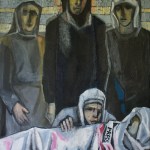
Over a decade ago, when I encountered Abed Abdi for the first time, I could not help but expect a productive and fruitful future for the painter. He was twenty one years old at the time and I came into possession of one of his early drawings, which enabled me, later on to see the artistic development of this young painter.
Sometimes we come across talents which we appreciate but without great expectations from the artist. This is not the case with Abed Abdi, whose striking talents, at a very early stage promised great ability to create a certain psychological atmosphere, intensive and magnetic like a whirlpool.
Later in 1964, I selected one of Abed Abdi’s paintings as a front cover for an edition of my second collection of poems, “Songs for the Way”. I have realized since then that our painter fully percieves what songs are our songs and what are our ways….because the artist has fully concieved our tragedy and has started his adventure to discover the lines and touches which identify our Self from the national and class aspects, at one and the same time.
No doubt the ever – dreaming eyes of Abed Abdi have absorbed much from the worlds of Sequers, Ismail Shamout and Kathi Kolvitz but those eyes have extended their vision into their own special depth so that the artist was able to escape the danger of imitation.
Three years ago, I visited Abed Abdi in the studio in which he “dwelled” in Dresden, during his seven years of study in the German Democratic Republic. This time I noticed his strong inclination towards wall painting and I was extremly happy about his outstanding preservation of the “intensive psychological atmosphere, gradually magnetic like a whirlpool”.
That atmosphere, in which the Arabs who, remained planted in their homeland, live since the catastrophe of 1948, is the tragic expectation which marks all the works of Abed Abdi .
The child, the tree, the wave, the gray cloud, the door, the outlet, the low horizontal line – all are charged with our image and our tragic expectation. This integrity perhaps, between the individual and the general, between Abed Abdi and ourselves, between ourselves and our suffering people who, live as refugess under occupation and between our people and thw wide world, harmonoiusly drawn in deep, perfect lines, is the secret of expectation aroused in one who becomes aquainted with the works of the painter Abed Abdi.
Haifa, 15.5.1973
included in “Abed Abdi – The Drawers Album”, 1973.



















